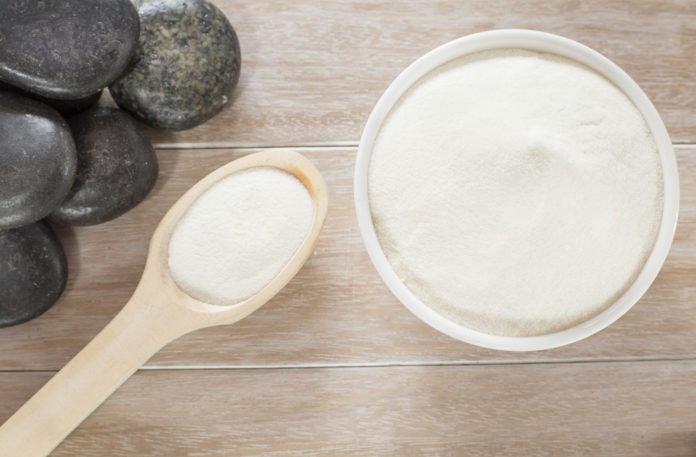Collagen is the most abundant protein in the body and found within in an array of tissues, including skin as the majority, muscles, tendons, ligaments, blood vessels, bones, dentin, and the digestive system.
Ultimately, collagen is the “glue” that keeps our bodies intact, along with warding off wrinkles, fine lines, and joint pain that often come with each passing year. But overtime, the environment and aging reduces the body’s ability to produce collagen.
Thus, Introducing Collagen Supplements
First off, especially if an omnivore, you are likely getting sufficient collagen in the diet. There are also various types of collagen, though is widely sourced from cow, chicken, fish, egg, and milk. Eating a well-balanced diet also increases the formation and use of collagen, including foods rich in vitamin C and copper.
Collagen can be created into a nutritional supplement from animal sources and typically found as hydrolyzed collagen, which helps form new collagen, and also known as collagen hydrolysate (CH) and peptides.
The spread of collagen supplements has sparked interest in health researchers and enthusiasts, especially related to the various tissues it comprises, including skin, joints, muscles, and the digestive tract mentioned above.
The Proclaimed Benefits of Collagen Supplements
Skin Health
Collagen supplements for skin health is perhaps the most idealized and sought out use for the formulated protein, particularly with it being so critical for giving skin its strength and elasticity. And there is some evidence that supports this notion.
A study published in Skin Pharmacology and Physiology randomized 69 women aged 35 to 55 years to receive 2.5 grams (g) or 5.0 g of collagen hydrolysate or placebo once daily for eight weeks. Women in the CH group demonstrated improvements in skin elasticity, moisture, and evaporation.
In regard to cellulite, a double-blind, placebo-controlled clinical study discovered regular ingestion of collagen peptides over a period of six months led to a clear improvement of the skin appearance in women suffering from moderate cellulite.
There is also evidence collagen peptides improves nail growth and reduces symptoms of brittle nails, while a lack of collagen may delay hair cycling and growth.
Lessen Joint Pain
The rich amino acids of collagen play an important role in the building of joint cartilage, which may also bare anti-inflammatory effects to lessen joint pain.
According to Arthritis Research UK, trials exploring collagen’s role in treating osteoarthritis give mixed results, while studies exploring the role of collagen in treating rheumatoid arthritis suggests it does not have a significant effect in reducing pain and joint inflammation.
Exercise Recovery
Considering the critical need for protein for exercise and muscle recovery, it makes sense collagen may augment recovery following workouts. And there is a study that backs such notion.
Published in the Current Medical Research and Opinion, researchers found collagen supplements can lessen joint pain and other parameters that have a negative impact on physical performance.
But do not sprint too fast, as only 97 athletes were included in the study and the findings are unluckily not definitive.
Muscle Mass Preservation
With advancing age, the loss of lean muscle mass is observed and places greater risk of falls and injuries and lack of independence. A study published in the Journal of the American Dietetic Association compared the effects of whey protein and collagen hydrolysate on body composition in older women.
Whereas body weight decreased following consumption of the whey supplement, there were no significant changes in body weight or composition resulting from the collagen supplement, thus hinting collagen preserves muscle mass.
Digestive Health
There is some evidence patients with inflammatory bowel disease have lower levels of collagen.
Nonetheless, there is speculation supplementing with collagen can reduce symptoms of digestive conditions by strengthening the intestinal lining and combatting against inflammation, including leaky gut, Crohn’s disease, and ulcerative colitis.
The Bottom Line: Will Collagen Supplements Really Make You Healthier?
Well, collagen supplements may be able prosper your health goals. But the price tag of collagen supplements is rather hefty, particularly when the uncertainty of their effectiveness outweighs a mere handful of significant successors following their use.
And not to mention, you may be getting more than you pay for… Collagen supplements are unregulated and may contain unwanted fillers.
Ultimately, most health experts suggest better off focusing on eating a healthy, balanced diet that’s naturally rich in protein and collagen.
Consuming additional nutrient-rich foods, incorporating aerobic exercises and strength training, sleeping the recommended seven to nine hours of sleep each night, managing stress, cutting back on alcohol, quitting cigarette smoking, and implementing other beneficial lifestyle habits can slow down the aging process and optimize health.








